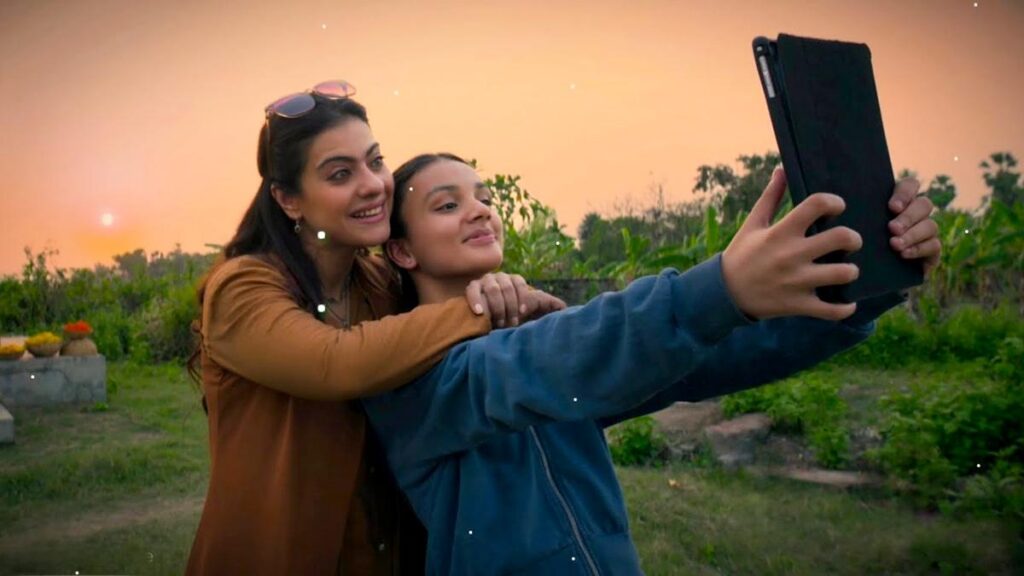What keeps the momentum going is Kajol’s fully committed performance that elevates this generic material to a surprising degree of watchability, feels Mayur Sanap.

At one point in Maa, a battered Kajol comes face-to-face with a satanic entity that has her daughter clutched under its influence.
She strives to save her daughter from the impending danger, only to be mocked by the devil, ‘Tum kya bacha paaogi isey.’
The devil obviously doesn’t know that it is up against Hindi Cinema’s most beloved character — maa — that has lent itself to a routine fodder for stories about love and resilience.
These days, Kajol is experimenting with roles that paint different shades of motherhood, be it her care-giving mother in Salaam Venky or an over-protective mom in Helicopter Eela or a flawed mother in Tribhanga or a silently suffering mother in Lust Stories 2.
In Maa, she plays Ambika, an everyday mother who is also capable of emanating fury if her child’s safety is at risk.
This is a flashy role that comes with an even flashier packaging of a star vehicle where Kajol gets to do high-decibel theatrics and fiery dialoguebaazi, even in moments where her character is bruised and broken.
The story revolves round a village named Chandarpur, which is ravaged by the rakshas called Daitya. It is a tree-dwelling entity that is sustained by ritualistic offerings of young girls.
Ambika (Kajol) is married to Shuvankar (Indraneil Sengupta), a native of Chandarpur, who left his ancestral village years ago.
A tragedy strikes and Ambika is forced to visit the very village she avoided all this while.
There she meets Joydev (Ronit Bose Roy), a village head who helps Ambika and her daughter Shweta (Kherin Sharma) to navigate the unease in their new surroundings.
Things take vicious turn when Shweta is carried off by the evil force.
A distraught Ambika learns a terrifying truth: Her daughter has been chosen for Daitya’s demonic ritual.
Director Vishal Furia, who previously helmed the riveting Marathi horror Lapachhapi and its tepid Hindi follow-ups Chhorii and Chhorii 2, once again shows his penchant for atmospheric horror that explores the theme of maternal instincts.
Certain narrative threads are strikingly similar to Chhorii 2, along with Furia’s usual commentary on patriarchy and female subjugation forming its core idea.
But the canvas for Maa is much bigger.
This is a film that comes with the self-branding of ‘mythological-horror.’ It takes a piece of Indian mythology and puts up a cinematic representation of Maa Kali as the Goddess of destruction.
The experiment of blending mythological lore with thrills and chills is definitely interesting, but Maa delivers only flimsy shock and awe without the backing of a strong script.
To compensate that, there’s a heavy reliance on jump scares and eerie soundscape to amplify the fear factor, but these genre cliches are off-putting in a decidedly self-serious horror drama like this.
The most disappointing aspect of all is the monster’s design.
As the creation of CGI (Computer-Generated Imagery), the character of Daitya frequently breaks the illusion of a dreaded monster, losing its ability to truly scare us. This is further hurt by tacky visual effects that only pulls us away from the narrative.
The design is an obvious knock-off of Night King from Game of Thrones, but given its tree-like characteristics, Daitya is like an unreasonable version of Groot (Except this monster speaks chaste Hindi instead of monosyllables).
What keeps the momentum going is Kajol’s fully committed performance that elevates this generic material to a surprising degree of watchability.
This holds true even when she mouths an utterly vanilla line like: ‘Jab tak teri maa tere sath hain, tera koi kuch nahin bigaad sakta.’
Her Ambika is strictly one-dimensional, but Kajol draws us into her ordeal and ensures it hits hard when it needs to.
She especially fares best in the film’s emotionally-charged finale.
Speaking of finale, the linkage between Maa and Shaitaan is established by the appearance of digitally-rendered visuals of R Madhavan. The entire sequence is so haphazardly placed and executed that it comes off as a jarring afterthought with its forced narrative connection.
Without any clear direction to move ahead, this so-called Devil’s Universe definitely feels wonky right now.
Maa Review Rediff Rating:



